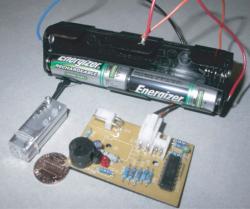Now, pocket-sized MRI scanners
 Washington, July 9 : Scientists at the Fraunhofer Institute for Biomedical Technology Engineering IBMT in Sankt Ingbert have invented pocket-sized scanners that can perform magnetic resonance imaging (MRI) scans in the field—such as to examine ice cores.
Washington, July 9 : Scientists at the Fraunhofer Institute for Biomedical Technology Engineering IBMT in Sankt Ingbert have invented pocket-sized scanners that can perform magnetic resonance imaging (MRI) scans in the field—such as to examine ice cores.
The researchers collaborated with a New Zealand-based company called Magritek to develop the small portable devices.
"Instead of the large superconducting magnets that have to be cooled with liquid helium and nitrogen, extra-strong permanent magnets are installed in our devices. There is no need for cooling anymore," said Dr. Frank Volke, head of the Magnetic Resonance working group at the institute.
The researchers arranged several permanent magnets in such a manner that the magnetic field lines overlap to form a homogeneous field.
They say that this helped them develop small, less expensive, and portable magnetic resonance spectrometers that can even be powered by batteries.
The pocket sized mobile nuclear magnetic resonance (NMR) devices may be useful for both doctors and scientists.
The first "Kea NMR moles" are already in use in the Antarctic, helping researchers to study the effects of environmental change by analysing the structure of ice masses or drilled ice cores.
The researchers concede that their devices cannot replace clinical MRI scanners for whole human body studies.
However, they say that there are many more potential applications for such devices, including delivering important data – directly and online – during production processes.
According to them, industrial manufacturers of sausages, cheese or candies can use such devices to analyse the fat or water content of their food products.
The spectrometers can also be employed to measure the humidity of materials, characterize the molecular structure of polymers, or determine the quality of trees for wood production. (ANI)